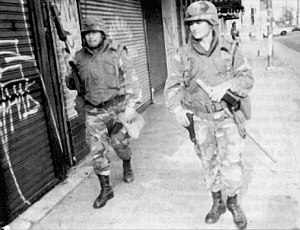Los Angeles riots of 1992
| 1992 Los Angeles riots | |
|---|---|

4,000 California Army National Guardsmen patrolled the city to enforce the law.
|
|
| Date | April 29 – May 4, 1992 |
| Location | Los Angeles County, California, United States |
| Causes | Reaction to acquittal of policemen on trial in beating of Rodney King; Death of Latasha Harlins |
| Methods | Widespread rioting, looting, assault, arson, protests, property damage, firefights, murder |
| Casualties | |
| Death(s) | 55 |
| Injuries | 2,000+ |
| Arrested | 11,000+ |
The 1992 Los Angeles riots, also known as the Rodney King riots, the South Central riots, the 1992 Los Angeles civil disturbance, the 1992 Los Angeles civil unrest, and the Los Angeles uprising, were a series of riots, lootings, arsons, and civil disturbances that occurred in Los Angeles County, California in April and May of 1992. The unrest began in South Central Los Angeles on April 29 after a trial jury acquitted four officers of the Los Angeles Police Department of the use of excessive force in the videotaped arrest and beating of Rodney King. It then spread throughout the Los Angeles metropolitan area as thousands of people rioted over a six-day period following the announcement of the verdict.
Widespread looting, assault, arson, and killings occurred during the riots, and estimates of property damage were over $1 billion. Order was only restored after members of the California Army National Guard, the 7th Infantry Division, and the 1st Marine Division were called in to stop the rioting when local police could not control the situation. In total, 55 people were killed during the riots, more than 2,000 people were injured, and more than 11,000 were arrested. LAPD chief of police Daryl Gates, who had already announced his resignation by the time of the riots, took much of the institutional blame.
On the evening of March 3, 1991, Rodney King and two passengers were driving west on the Foothill Freeway (I-210) through the Lake View Terrace neighborhood of Los Angeles. The California Highway Patrol (CHP) attempted to initiate a traffic stop. A high-speed pursuit ensued with speeds estimated at up to 115 mph (185 km/h), first over freeways and then through residential neighborhoods. When King finally came to a stop, CHP Officer Timothy Singer and his wife, CHP Officer Melanie Singer, ordered the occupants under arrest.
...
Wikipedia
